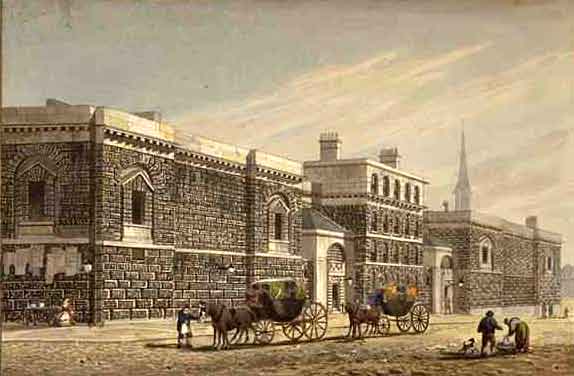LGBT+ CAMDEN – Our dark history, sent to the gallows for socialising at the gay bars of the 1700s
Mother Clap was locked into a pillory on Saffron Hil
Monday, 14th February 2022 — By Dan Carrier

Newgate Prison
GABRIEL Lawrence, William Griffin, and Thomas Wright were woken in their cells and roughly handled as they were dragged to the cart waiting in the cold morning outside Newgate Prison.
It was early 1727, and the three men were driven through city streets to meet their deaths at the Tyburn gallows.
Their “crime”? To be caught at a Molly House – a secret space for gay people which had flourished in the 1700s and could be found around Covent Garden, Holborn and Bloomsbury.
At this time, and into the Georgian period, historians estimate there were more “gay” pubs and clubs in London than there are today.
With sex between two men then a crime punishable by fine, imprisonment and the death penalty, Molly Houses offered a social space where like-minded people could meet in comparative safety.
However, visiting was not without risks.
In the 1790s and beyond, the reactionary Christian group The Society for the Reform of Manners took it on themselves to launch a campaign against Molly Houses and the men who visited them.
It proclaimed it was its duty to root out “profane and immoral practices,” especially among the “lower” classes.
One such Molly House could be found in Tottenham Court Road, opened in the 1720s by its proprietor, a freed slave called Julius Caesar Taylor.
Taylor did not solely run his club for the profits; in 1728 he was arrested and charged with “indecent relations with another man”.
Regular police raids, such as the kind that saw Taylor arrested, were prompted by informers, agents provocateurs and undercover officers fishing for evidence.
Court reports from the period reveal the levels of oppression faced.
One man, called Flying Horse Moll by his friends, earned a criminal record after being arrested at a New Year’s Eve party in Drury Lane. Officers raided the private event and it was reported that men dressed as queens and shepherdesses fought with the police as they tried to evade arrest.
Moll was taken into custody with 39 other men who were placed before a magistrate in their fancy dress.
Then came a bust in Holborn at a place known as Mother Claps, which led to the execution of three men.
Based in Field Lane, Mother Claps was run by Margaret “Mother” Clap and was put under police surveillance between 1724 and 1726.
Two undercover officers gathered evidence of men socialising together before a raid on the premises.
Mother Clap was locked into a pillory on Saffron Hill, where she was so badly attacked by the public she collapsed and did not recover from her injuries.
It wouldn’t be until 1861 that the death penalty was scrapped – though homosexual acts were still punished with prison terms and fines.